The Seagate IronWolf 110 480GB is a really interesting drive. While we have been hearing prophecies about SSDs replacing hard drives for capacity storage for years, and those have not come true yet, the performance market is different. These days, you deploy NAND flash if you want to go reasonably fast and Optane or NVDIMMs if you need something faster. The IronWolf 110 is the company’s foray into the lower-end NAS SSD market. These are not the same drives one will commonly find in HPE, Dell EMC, or NetApp storage arrays. Instead, they are designed for the low-cost NAS segment dominated by players such as QNAP and Synology.
In our review, we are going to see what these drives have to offer. We are then going to see how they perform. Finally, we are going to discuss the market impact in our Final Words section.
Seagate IronWolf 110 480GB Overview
With a 480GB capacity, the IronWolf 110 is not the largest SSD either in physical size nor capacity. The drive itself comes in consumer-oriented packaging that is very colorful. Since we tend to deal with higher-end servers and storage, our drives usually come in bulk packaging but it is refreshing to see this change. Inside the packaging, we get a fairly typical 2.5″ SSD.
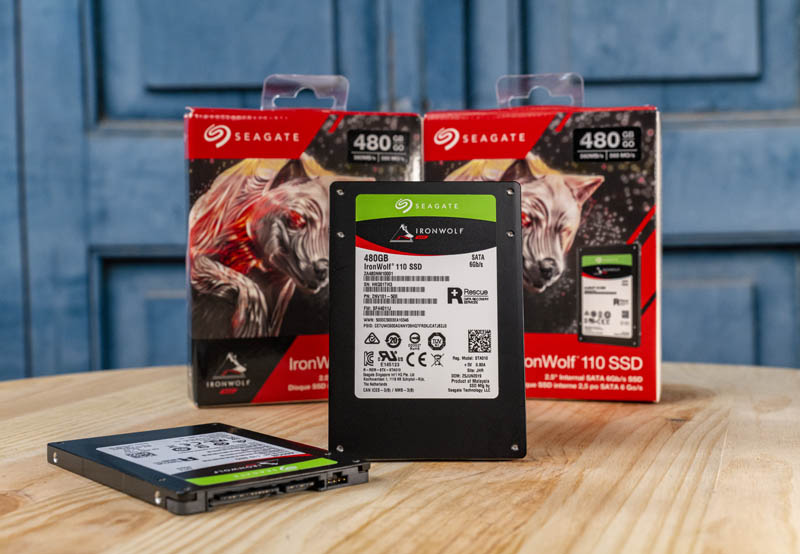
You can seethe Rescue label here. Not only do these drives have a 5-year warranty, but they also come with 2 years of Seagate Rescue Data Recovery Services. If the drives fail in the first two years, one can send them away and attempt to get the data restored.
The drive itself uses a SATA III 6.0gbps interface. That practically means we are limited to a mid-500MB/s performance range due to the interface. For some perspective, as we transition to PCIe Gen4, we are seeing and have in the STH lab, enterprise drives already running at well over twelve times this level of performance. Alas, that is precisely the appeal of the IronWolf 110. It is designed to be a hard drive alternative and used in lower-end NAS systems. These NAS systems typically focus on SATA III connectivity for hard drives and the IronWolf 110 is designed to be a flash alternative for those drive bays.
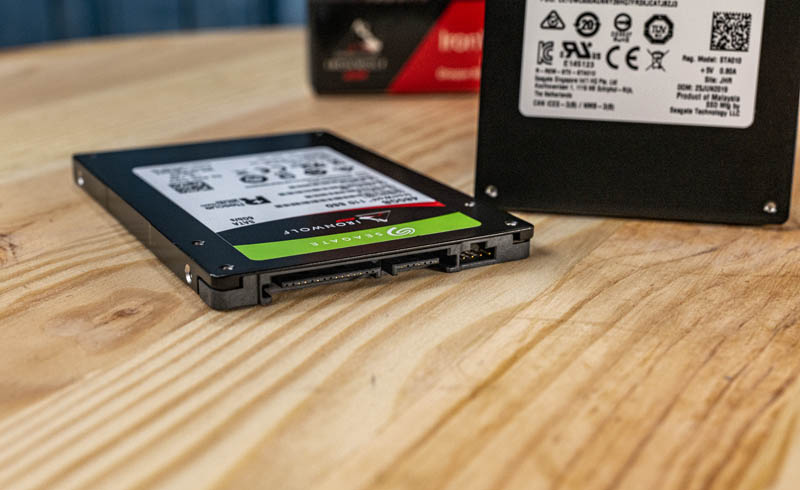
We are testing the 480GB model here, but we wanted to note that the range scales from 240GB-3.84TB. The larger SSDs are what Patrick used with his Jellyfish Fryer All-Flash NAS collaboration. Here is the spec table for the line:
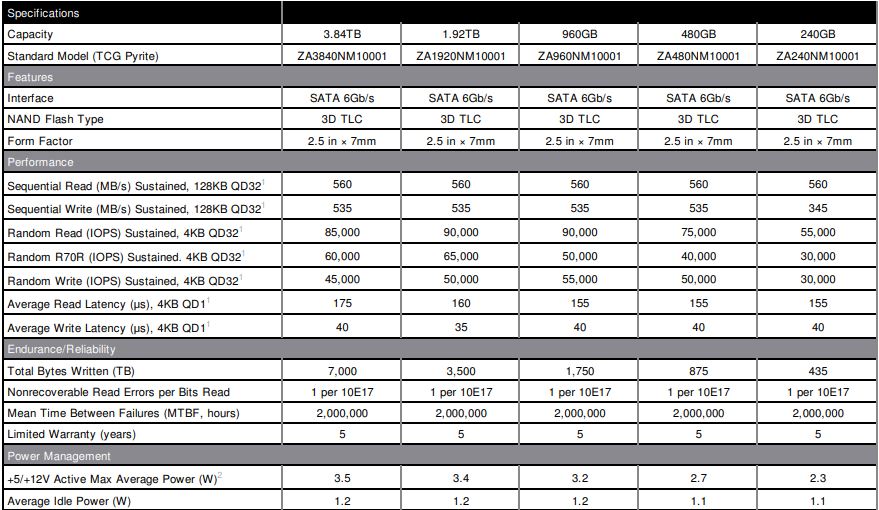
The 480GB drive has an 875TBW endurance rating which is more than most will ever write to a drive like this. Years ago STH did a survey using used enterprise SSDs and found very few were writing anywhere near their endurance ratings. Seagate is using its DuraWrite technology on these drives which you can learn more about here:
The drives feature PLP to keep data safe in the event of a power event as well. We covered this in our Seagate IronWolf 110 3.84TB SATA SSD for NAS Applications piece as well.
Now that we have discussed the drives, let us get to testing.
Seagate IronWolf 110 480GB Benchmark Performance
This drive is not designed to be a server drive hammered by OLTP databases 24×7. Still, as a read cache drive, boot drive, or other lighter-duty tasks, it is serviceable. We are going to run through a few sets of numbers to test the performance claims made for the drive.
Blackmagic Disk Speed Test
This is a popular speed test in the video community. It shows whether a storage device is suitable for throughput required at a given video format.
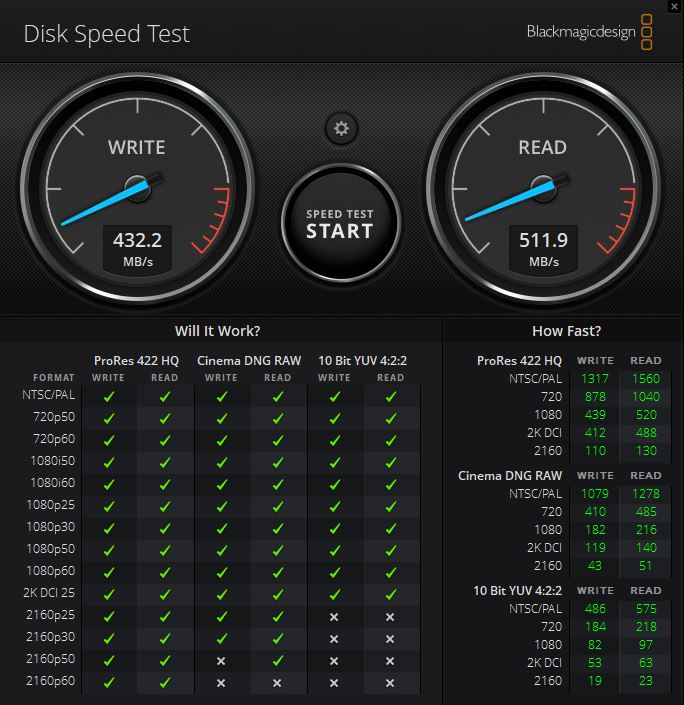
You can see with some of the higher-end 4k60 tests the SATA interface drive is simply unable to cope. For a majority of workloads, these drives work well.
Anvil’s Storage Utilities
Anvil’s Storage Utilities shows us the performance of the device across a number of common SSD performance vectors.
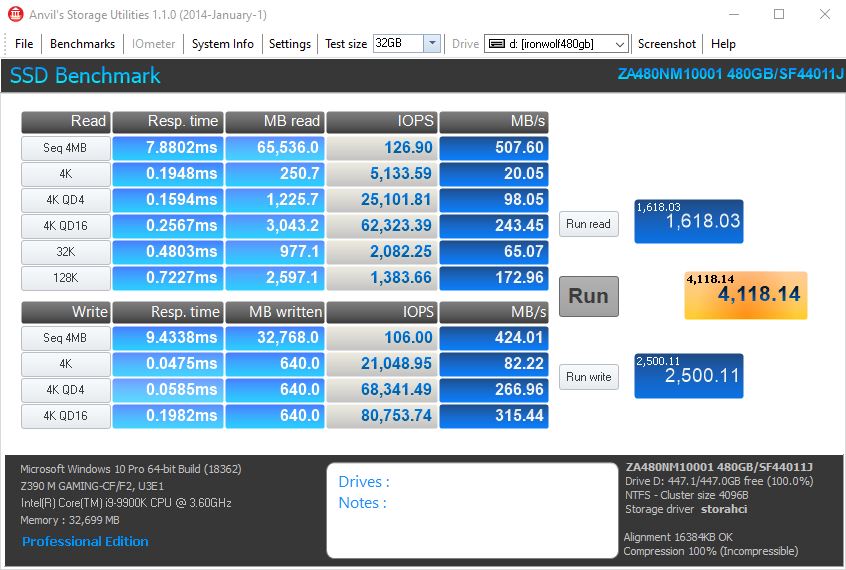
Here we are seeing this write figure just above the 400MB/s range and reads above 500MB/s/ We are also seeing 4K write IOPS exceed 80K in our testing which is a strong result.
AS SSD Benchmark
AS SSD is another easy-to-use storage benchmark tool specifically for SSDs.
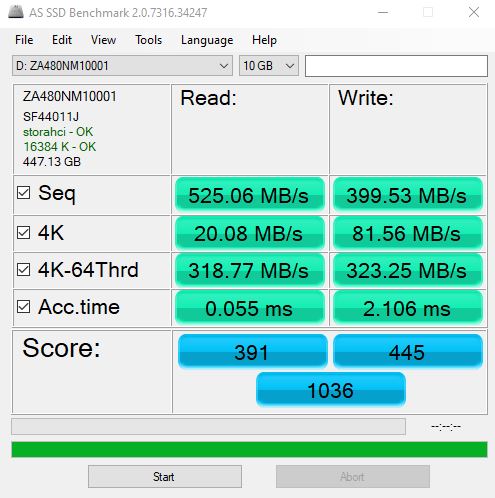
Our AS SSD benchmark largely shows a similar performance trend. One of the key features here is that this drive can in all but the most extreme 4K random cases, saturate well beyond a 1GbE link. For those looking to purchase a NAS with one of these drives, we highly recommend a 5GbE or 10GbE capable NAS.
CrystalDiskMark Benchmark
CrystalDiskMark has been around for years. It offers a different look at performance.
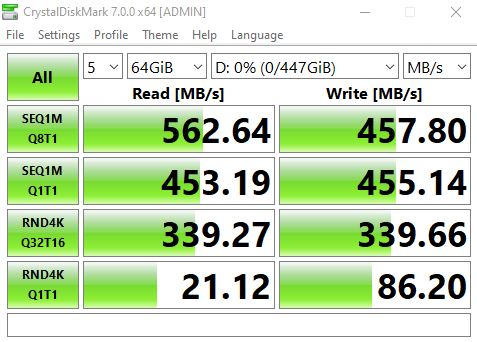
CrystalDiskMark shows us a similar trend except that we are getting 560MB/s read speeds here aligning to the drive specs. Write speeds are 457MB/s which is getting closer to the rated 535MB/s.
ATTO Disk Benchmark
ATTO is a well-known tool that focuses on sequential performance.
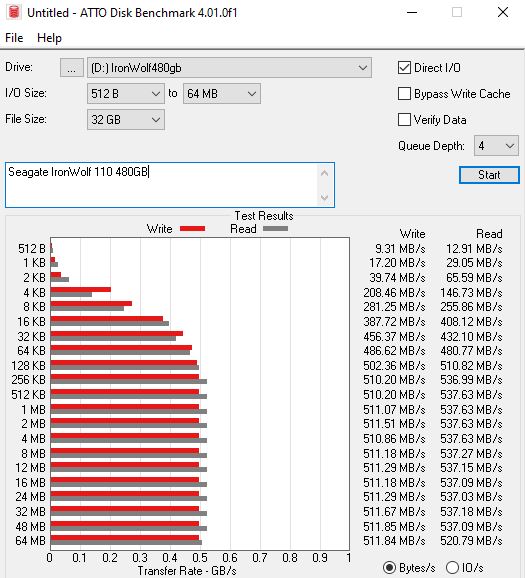
ATTO tends to be the standard for sequential reads/ writes. Normally our 32GB QD4 test gets us to rated speeds. On both reads and writes we get above 500MB/s but not to 560/535MB/s here.
Final Words
This is a case where the SSDs perform much better than hard drives even if we did not get full rated speeds in our quick testing. We were at least close to what Seagate offers. While SATA SSDs are high-performing from the perspective of hard drive alternatives, they are now less than 10% as fast as their newer SSD counterparts. A major sacrifice one makes using a NAS unit from QNAP or Synology is that they are designed for SATA not faster NVMe storage. Still, for the target market, the IronWolf 110 480GB is a big upgrade.
For many NAS applications, a 480GB NAS SSD is great. If you have some VMs where you need faster storage or simply a cache SSD, this is a good option in the 10GbE and lower-end NAS segment. The 480GB market is not one that is a focus of enterprise drive vendors today so this helps define the segment as well.
The Seagate IronWolf 110 480GB SSD is a solid drive that performs well. If you have a SMB focused NAS solution and need a SATA SSD to deliver more performance than hard drives, this is a great option.

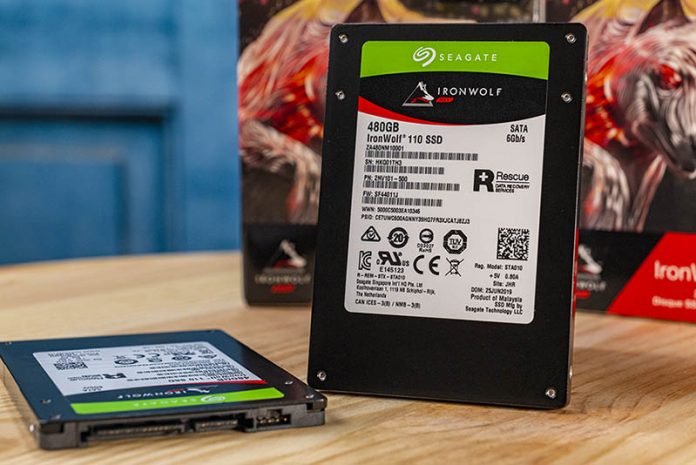
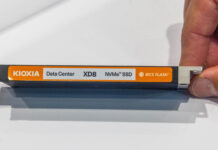
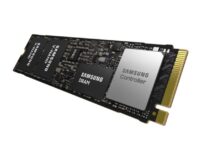
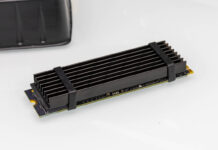
On Amazon, 480GB cost $125. Which is extremely expensive. I dont need NVMe for NAS SSD drive. Even the SATA 6Gbps is enough to saturate NBase-T / 5Gbps Ethernet. And a RAID Setup is enough for 10Gbps Ethernet.
I was rather hoping being SATA 6Gbps it would be cheaper.
But then again most consumer cant even get affordable 2.5Gbps Ethernet.
There is a market for consumer flash in the NAS sector, at these prices though, it makes it a tough sell. I’ve been using the Crucial MX500 drives for my NAS and Proxmox configurations for some time with no issues, power loss protection, durability, and price per GB being the key factors.
How big is the PLP protected cache? 1KB?
I’ve asked Seagate and they will NOT tell you!! Hmmm